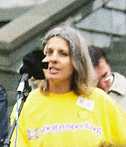Laila Harré

Laila Jane Harré (born 8 January 1966) is a New Zealand politician and trade unionist. She was a Member of Parliament for the Alliance party, and became the party's leader for a brief period after the group experienced a schism in 2002.
Early life
Harré was educated in Auckland and gained Bachelor of Arts and Bachelor of Laws degrees at the University of Auckland. After leaving university, she worked for some time as a lawyer specialising in industrial relations and employment law, developing close links to the trade union movement.
Political career
Harré joined the Labour Party in 1982, representing the youth wing on the party's New Zealand Council. Throughout her seven-year membership of the party she was a critic of the policies advanced by Roger Douglas, who became Minister of Finance when Labour won the 1984 election. Douglas, an advocate of free market economics, introduced a programme of radical reforms (Rogernomics) which alienated many of Labour's traditional supporters, including Harré.
In 1989, Harré resigned from the Labour Party. She became a founding member of the NewLabour Party, an organisation led by dissident Labour MP Jim Anderton. NewLabour later amalgamated with several other parties to form the Alliance. Harré stood as the Alliance candidate for the Te Atatu electorate in the 1993 elections, but was unsuccessful.
Member of Parliament
| Parliament of New Zealand | ||||
| Years | Term | Electorate | List | Party |
| 1996–99 | 45th | List | 8 | Alliance |
| 1999–2002 | 46th | List | 6 | Alliance |
In the 1996 elections, which were held under the new MMP electoral system, Harré was ranked in eighth place on the Alliance list. The Alliance gained a sufficient number of votes for Harré to enter parliament.[1]
After the 1999 elections, the Alliance formed a coalition government with Labour (which had by then backed away from many of the policies introduced by Douglas). Harré became Minister of Women's Affairs and Minister of Youth Affairs and Associate Minister of Labour and Commerce. She later gained additional responsibilities as Minister of Statistics.[1]
She led the parliamentary campaign for the introduction of paid parental leave from Opposition and as a Minister sponsored the legislation to introduce 12 weeks paid parental leave in 2002. Other causes championed by Harré included legislation protecting the interests of building industry sub-contractors, significant minimum wage increases and the removal of age discrimination in the minimum wage. She re-launched the pay equity debate as Minister of Women's Affairs, and a campaign to increase annual leave from three weeks to four weeks.
In 2002, however, the Alliance began to show signs of internal strain. In particular, some members of the party felt that it was losing its independent political identity and failing to make it clear where the differentiation was between itself and the Labour Party on issues such as free trade, tertiary education funding and other core areas of difference. The decision of Jim Anderton and a majority of Alliance MPs to back New Zealand's involvement in the US-led invasion of Afghanistan brought these tensions to a head, dividing the caucus and from the majority in the non-parliamentary party organisation (led by Matt McCarten). Harré, however, was aligned to the grass-roots party view, and became its de facto leader in parliament.
The collapse of the Alliance soon became inevitable, with Anderton and his supporters deciding to contest the 2002 elections as a new party (the Progressives). Harré, considered to be the foremost of the MPs who remained behind, was chosen to lead what remained of the Alliance into its election campaign, aiming to at least retain a presence in parliament. Harré herself was seen as the party's best chance of keeping a parliamentary seat, having a relatively strong chance of winning the seat of Waitakere. In the election itself, however, Harré placed second, being defeated by Labour's Lynne Pillay.
The following year, Harré stepped down as leader of the Alliance, being replaced by Matt McCarten. She was not aligned to any other political party from 2002-2011 but in 2012 accepted a role as issues director of the Green Party.[2]
Life after politics
From 2002 to 2005 Harré led the industrial work of the New Zealand Nurses Organisation, including its successful pay equity campaign for public sector nurses. She was General Secretary of the National Distribution Union from 2005 to 2009,[3] after which she joined the Auckland Transition Agency.[4]
Harré was diagnosed with breast cancer, because she has a family history of the disease, she opted for a double mastectomy and breast reconstruction. She made a full recovery.[5]
In 2012 she was employed by the Green Party after working for the International Labour Organisation in Fiji since 2010.[6] She participated in the 2013 Boston Marathon, and was only a few hundred metres away when one of the bombs exploded.[7][8]
References
- ↑ 1.0 1.1 "Hon Laila Harré". Wellington: New Zealand Government. Retrieved 28 February 2010.
- ↑ "Laila Harre signs up with the Greens". Stuff.co.nz. Retrieved 10 March 2013.
- ↑ Changes at the Helm of National Distribution Union, press release, National Distribution Union, 7 July 2009. Retrieved 8 April 2010.
- ↑ Laila Harré joins the ATA, press release, Auckland Transition Agency, 7 July 2009. Retrieved 8 April 2010.
- ↑ http://www.nzherald.co.nz/politics/news/article.cfm?c_id=280&objectid=10810190
- ↑ "Laila Harre joins the Green Party". New Zealand Herald. 30 March 2012=. Retrieved 2012-03-30.
- ↑ "Kiwi in Boston feeling the 'aroha'". 3 News NZ. 17 April 2013.
- ↑ "Kiwi runners at the heart of Boston blast chaos". stuff.co.nz. 16 May 2012=. Retrieved 2012-05-16.
| ||||||||||||||